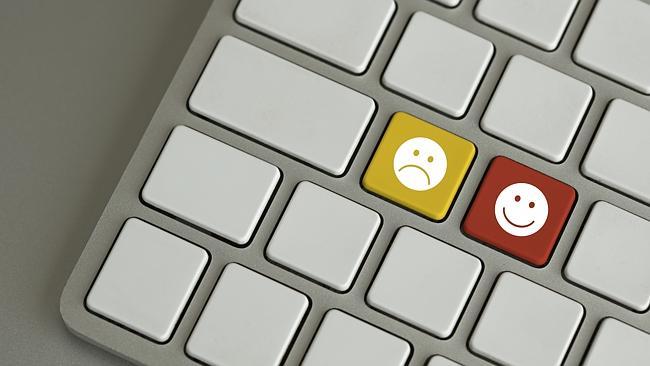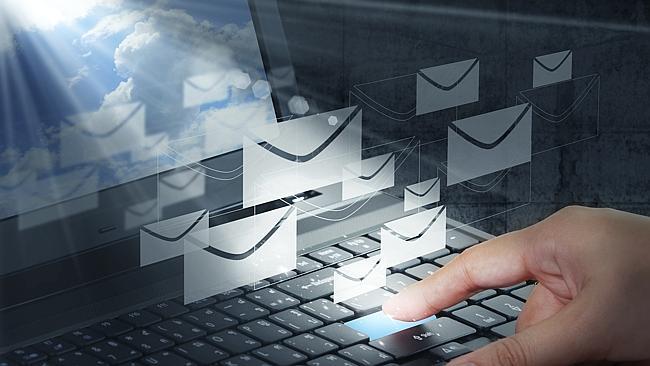Study shows the tactics we use to keep on top of our emails are actually driving us to distraction - and addiction
IF you're reading this you're tired, overworked and seeking distraction. These are symptoms of email stress - so how is your inbox slowly killing you?

At Work
Don't miss out on the headlines from At Work. Followed categories will be added to My News.
IF you're reading this you're probably tired, overworked and seeking distraction. And each of the above is a key symptom of intense email stress. So why is your inbox slowly killing you?
Most of the strategies you're using to deal with email are probably wrong.
In fact, they're probably making things worse.
A British researcher is analysing the habits of email users and established what repercussions they have when it came to coping with electronic communications.
What she has found so far has consequences for the wellbeing and efficiency of most office workers.
Dr Emma Russell told an Annual Conference of the British Psychological
Society': "This research reminds us that even though we think are using adaptive and functional strategies for dealing with our email at work, many of these strategies can be detrimental to other goals and the people that we work with."
What does this mean?
We're doing it wrong.
Our intentions are good: We approach our emails with the desire to improve our efficiency, control, practicality and a desire to assist colleagues.
What we actually get is something very different.
Anxiety, compulsion - and a range of potentially 'pathological' behaviours.
"I feel compelled to constantly check my email": Sound familiar?
What about: "I feel anxious about deleting an email"?
So what's the solution to email overload?
Don't email Dr Russell. She'll email you.
DISCUSSION: What email coping strategies actually work for you? Have your say in the comment box below.
That's 'phase two' of her research.
Instead, we'll have a go.

Email alerts on: This is a great idea - if you want to show diligence and concern for others. But how far can you spread your love? Dr Russell says her survey seems to suggest that a constant barrage of alert panels can strip you of your sense of being in control. So the juggle between email alerts and manually opening your inbox is a game you'll have to play according to the needs of the moment. Just don't be afraid to turn them on and off, as needed.
Ignore them all: Sounds tempting. In fact, we probably all adopt this policy at times - particularly when we're busy. Or bored. But the sense that we're missing something will eat away at us slowly. And then come the repercussions for not seeing that demand for immediate action from the boss. So adapt the frequency of checking your inbox to the level of demand you are under. Just don't let it set there all day.

Email ping-pong: Feel compelled to have the last say? We'll, you're probably wondering why you and your team get nothing done. Don't. Firing off dozens of little one-liners does nothing but waste time and cause confusion. Put your thoughts together in one neat package and move on.

Asking for read-receipts: What do you hope to achieve anyway? Is there some legal requirement attached to reading the email? If not … are you simply seeking to intimidate? The between-the-lines stresses invoked by redundant read-receipts are an unwelcome addition to today's pressure-cooker office environment. Be nice.

Absent-presence emailing: Do people get annoyed at you when you SMS while chatting? Well, it also applies to emails - both ways. Dealing with your emails while in company can be construed as a sign of obsessive-compulsive behaviour. Let it go. Not only are your replies likely to be disjointed and useless, what's left of your social life will rapidly evaporate.

Out-of-hours contact: Find yourself responding to work emails from home in the same way you do from work? Don't. They don't know you're not in the office. So they will naturally treat you as if you are. If you value the concept of down time, pick-and-choose what you reply to and make it very clear that you are doing this out of the goodness of your own conscientious heart, and not on company time.

In fact, if you suspect you're spending too much time browsing your emails, social media accounts and the internet, it's a sure sign you're suffering the demands of excessive work.
"Those individuals who use technology to enable working beyond office hours tend to be highly successful in their jobs, but are at a high risk of developing other problems," Dr Cristina Quinones-Garcia told the same gathering of the British Psychological Society (BPS).
Dr Quinones-Garcia has studied the internet usage, emotional stability, workloads, compulsive activities and life satisfaction levels of a group of British men and women to see if there was any links.
What she found was over 60 per cent of us believe we sufferer from compulsive internet usage. And the main reason we give is overwork.
While the unemployed spent longer online, such people did not display the same level of compulsive behaviour.
"Working excessively was strongly associated with compulsive internet use -
even when allowing for the factor of emotional stability," her BPS report reads.
So what online activity do we indulge in most to relieve the tensions of a demanding job?

Flirting.
But it doesn't seem to work.
Dr Quinones-Garcia says those displaying the greatest level of compulsive access are at high risk of suffering isolation, depression and anxiety.
Regularly turning to the internet for relief also eventually produces withdrawal symptoms, she says.
Her report warns employers should not underestimate the risks involved in pushing their workers "given the effects the internet has on people's lives".
###

